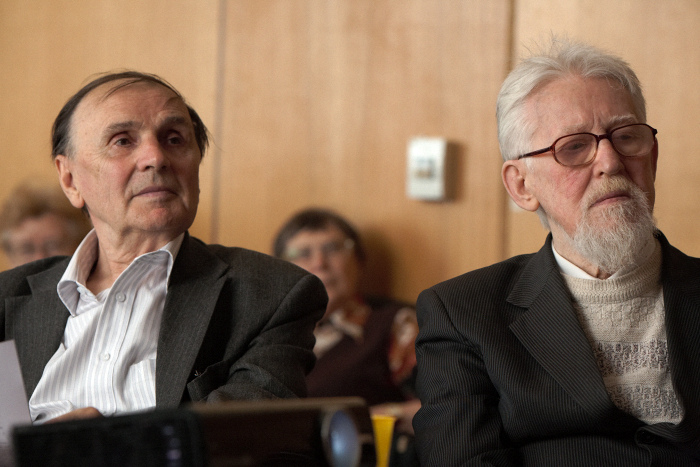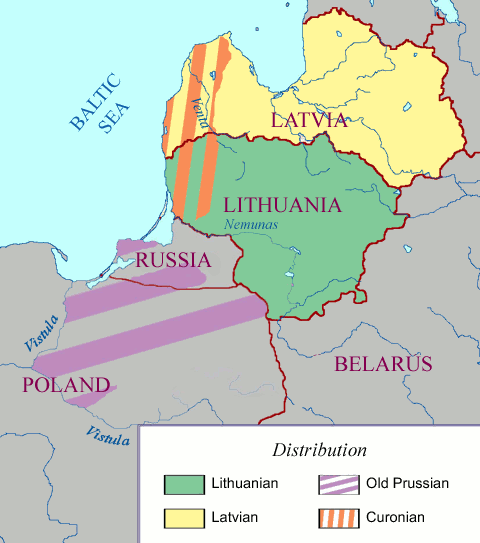|
Vladimir Dybo
Vladimir Antonovich Dybo (russian: Влади́мир Анто́нович Дыбо́; born 30 April 1931) is a Soviet and Russian linguist, Doctor Nauk in Philological Sciences (1979), Professor (1992), Academician of the Russian Academy of Sciences (2011). A specialist in comparative historical linguistics and accentology, he is well-known as one of the founders of the Moscow School of Comparative Linguistics. Biography Dybo graduated from the Department of Russian language and Literature of the Faculty of History and Philology of State University of Gorky (1954) and postgraduate studies at the department of common and comparative linguistics of the Faculty of Philology of Moscow State University. Since 1958, he has been working at the Institute for Slavic Studies of the USSR Academy of Sciences (RAS): senior scientific and technical research fellow, junior research fellow, senior research fellow, leading research fellow; At present, he is the chief researcher at the Depart ... [...More Info...] [...Related Items...] OR: [Wikipedia] [Google] [Baidu] |
Doctoral Degree
A doctorate (from Latin ''docere'', "to teach"), doctor's degree (from Latin ''doctor'', "teacher"), or doctoral degree is an academic degree awarded by universities and some other educational institutions, derived from the ancient formalism ''licentia docendi'' ("licence to teach"). In most countries, a research degree qualifies the holder to teach at university level in the degree's field or work in a specific profession. There are a number of doctoral degrees; the most common is the Doctor of Philosophy (PhD), awarded in many different fields, ranging from the humanities to scientific disciplines. In the United States and some other countries, there are also some types of technical or professional degrees that include "doctor" in their name and are classified as a doctorate in some of those countries. Professional doctorates historically came about to meet the needs of practitioners in a variety of disciplines. Many universities also award honorary doctorates to individual ... [...More Info...] [...Related Items...] OR: [Wikipedia] [Google] [Baidu] |
Northwest Caucasian Languages
The Northwest Caucasian languages, also called West Caucasian, Abkhazo-Adyghean, Abkhazo-Circassian, Circassic, or sometimes ''Pontic languages'' (from the historical region of Pontus, in contrast to ''Caspian languages'' for the Northeast Caucasian languages), are a family of languages spoken in the northwestern Caucasus region,Hoiberg, Dale H. (2010) chiefly in three Russian republics (Adygea, Kabardino-Balkaria, Karachay–Cherkessia), the disputed territory of Abkhazia, Georgia, and Turkey, with smaller communities scattered throughout the Middle East. The group's relationship to any other language family is uncertain and unproven. One language, Ubykh, became extinct in 1992, while all of the other languages are in some form of endangerment, with UNESCO classifying all as either "vulnerable," "endangered," or "severely endangered." The Northwest Caucasian languages possess highly complex sets of consonant distinctions paired with a lack of vowel distinctions, often p ... [...More Info...] [...Related Items...] OR: [Wikipedia] [Google] [Baidu] |
Nostratic
Nostratic is a controversial hypothetical macrofamily, which includes many of the indigenous language families of Eurasia, although its exact composition and structure vary among proponents. It typically comprises Kartvelian, Indo-European and Uralic languages; some languages from the similarly controversial disputed Altaic family; the Afroasiatic languages spoken in North Africa, the Horn of Africa, the Arabian Peninsula and the Near East as well as the Dravidian languages of the Indian Subcontinent (sometimes also Elamo-Dravidian, which connects India and the Iranian Plateau). The hypothetical ancestral language of the Nostratic family is called Proto-Nostratic. According to Allan Bomhard, Proto-Nostratic would have been spoken between 15,000 and 12,000 BCE, in the Epipaleolithic period, close to the end of the last glacial period, perhaps in or near the Fertile Crescent. The Nostratic hypothesis originates with Holger Pedersen in the early 20th century. The name "Nost ... [...More Info...] [...Related Items...] OR: [Wikipedia] [Google] [Baidu] |
Indo-European Languages
The Indo-European languages are a language family native to the overwhelming majority of Europe, the Iranian plateau, and the northern Indian subcontinent. Some European languages of this family, English, French, Portuguese, Russian, Dutch, and Spanish, have expanded through colonialism in the modern period and are now spoken across several continents. The Indo-European family is divided into several branches or sub-families, of which there are eight groups with languages still alive today: Albanian, Armenian, Balto-Slavic, Celtic, Germanic, Hellenic, Indo-Iranian, and Italic; and another nine subdivisions that are now extinct. Today, the individual Indo-European languages with the most native speakers are English, Hindi–Urdu, Spanish, Bengali, French, Russian, Portuguese, German, and Punjabi, each with over 100 million native speakers; many others are small and in danger of extinction. In total, 46% of the world's population (3.2 billion people) speaks an ... [...More Info...] [...Related Items...] OR: [Wikipedia] [Google] [Baidu] |
Iranian Languages
The Iranian languages or Iranic languages are a branch of the Indo-Iranian languages in the Indo-European language family that are spoken natively by the Iranian peoples, predominantly in the Iranian Plateau. The Iranian languages are grouped in three stages: Old Iranian (until 400 BCE), Middle Iranian (400 BCE–900 CE) and New Iranian (since 900 CE). The two directly-attested Old Iranian languages are Old Persian (from the Achaemenid Empire) and Old Avestan (the language of the Avesta). Of the Middle Iranian languages, the better understood and recorded ones are Middle Persian (from the Sasanian Empire), Parthian (from the Parthian Empire), and Bactrian (from the Kushan and Hephthalite empires). , there were an estimated 150–200 million native speakers of the Iranian languages. '' Ethnologue'' estimates that there are 86 languages in the group, with the largest among them being Persian (Farsi, Dari, and Tajik dialects), Pashto, Kurdish, Luri, and Balochi. T ... [...More Info...] [...Related Items...] OR: [Wikipedia] [Google] [Baidu] |
Baltic Languages
The Baltic languages are a branch of the Indo-European language family spoken natively by a population of about 4.5 million people mainly in areas extending east and southeast of the Baltic Sea in Northern Europe. Together with the Slavic languages, they form the Balto-Slavic branch of the Indo-European family. Scholars usually regard them as a single subgroup divided into two branches: Western Baltic (containing only extinct languages) and Eastern Baltic (containing at least two living languages, Lithuanian, Latvian, and by some counts including Latgalian and Samogitian as separate languages rather than dialects of the two aforementioned languages). The range of the Eastern Baltic linguistic influence once possibly reached as far as the Ural Mountains, but this hypothesis has been questioned. Old Prussian, a Western Baltic language that became extinct in the 18th century, has possibly retained the greatest number of properties from Proto-Baltic. Although related, Li ... [...More Info...] [...Related Items...] OR: [Wikipedia] [Google] [Baidu] |
Slavic Languages
The Slavic languages, also known as the Slavonic languages, are Indo-European languages spoken primarily by the Slavic peoples and their descendants. They are thought to descend from a proto-language called Proto-Slavic, spoken during the Early Middle Ages, which in turn is thought to have descended from the earlier Proto-Balto-Slavic language, linking the Slavic languages to the Baltic languages in a Balto-Slavic group within the Indo-European family. The Slavic languages are conventionally (that is, also on the basis of extralinguistic features) divided into three subgroups: East, South, and West, which together constitute more than 20 languages. Of these, 10 have at least one million speakers and official status as the national languages of the countries in which they are predominantly spoken: Russian, Belarusian and Ukrainian (of the East group), Polish, Czech and Slovak (of the West group) and Bulgarian and Macedonian (eastern dialects of the South group), ... [...More Info...] [...Related Items...] OR: [Wikipedia] [Google] [Baidu] |
Monographs
A monograph is a specialist work of writing (in contrast to reference works) or exhibition on a single subject or an aspect of a subject, often by a single author or artist, and usually on a scholarly subject. In library cataloging, ''monograph'' has a broader meaning—that of a nonserial publication complete in one volume (book) or a definite number of volumes. Thus it differs from a serial or periodical publication such as a magazine, academic journal, or newspaper. In this context only, books such as novels are considered monographs.__FORCETOC__ Academia The English term "monograph" is derived from modern Latin "monographia", which has its root in Greek. In the English word, "mono-" means "single" and "-graph" means "something written". Unlike a textbook, which surveys the state of knowledge in a field, the main purpose of a monograph is to present primary research and original scholarship ascertaining reliable credibility to the required recipient. This research is pre ... [...More Info...] [...Related Items...] OR: [Wikipedia] [Google] [Baidu] |
Medal "In Commemoration Of The 850th Anniversary Of Moscow"
The Medal "In Commemoration of the 850th Anniversary of Moscow" (russian: Медаль «В память 850-летия Москвы») is a commemorative medal of the Russian Federation created to denote the 850th anniversary of the city of Moscow. It was established on 26 February 1997 by Presidential Decree № 132. Its statute was defined on 21 March 1997 by Presidential Decree 223. Medal statute The Medal "In Commemoration of the 850th Anniversary of Moscow" is awarded to participants in the defence of Moscow who were awarded a medal for the defence of Moscow, wartime workers who worked in Moscow during the Great Patriotic War of 1941–1945, persons who were awarded the Soviet Medal "In Commemoration of the 800th Anniversary of Moscow"; citizens who have made a significant contribution to the development of the city of Moscow. Presidential Decree 1099 of 7 September 2010 removed the Medal "In Commemoration of the 850th Anniversary of Moscow" from the list of state awar ... [...More Info...] [...Related Items...] OR: [Wikipedia] [Google] [Baidu] |
Vladislav Illich-Svitych
Vladislav Markovich Illich-Svitych (russian: Владисла́в Ма́ркович И́ллич-Сви́тыч, also transliterated as Illič-Svityč; September 12, 1934 – August 22, 1966) was a Soviet linguist and accentologist. He was a founding father of comparative Nostratic linguistics and the Moscow School of Comparative Linguistics. Biography Of Polish-Jewish descent, Illich-Svitych was born in Kiev. In 1941, he moved with his parents to Chkalov (now Orenburg) and later to Moscow. His father, Mark Vladislavovich Illich-Svitych (1886–1963), worked as a bookkeeper. His mother, Klara Moiseevna Desner (1901–1955), was chief director of puppet theater in Orenburg. He resuscitated the long-forgotten Nostratic hypothesis, originally proposed by Holger Pedersen in 1903. While embarking on a field trip to collect data on the Hungarian dialects of the Carpathians, he died in an automobile accident on August 22, 1966, near Moscow. His death prevented him from completing ... [...More Info...] [...Related Items...] OR: [Wikipedia] [Google] [Baidu] |
Russian Academy Of Natural Sciences
The Russian Academy of Natural Sciences ( Russian: Российская академия естественных наук) is a Russian non-governmental organization founded on August 31 1990 in Moscow in the former Soviet Union, following a decree by the Supreme Soviet of Russia. , the Academy operates under the Federal Law of August 23, 1996 No. 127-FZ "On Science and State Scientific-Technical Politics". The academy states that it seeks to unite scholars in different fields for the betterment of Russia. As of 2020, its president is Oleg Leonidovich Kuznetsov and its Vice President and Chief Secretary is Lida Vladimirovna Ivanitskaya. The academy is not associated with the Russian Academy of Sciences. It has been criticised because many members lack scientific credentials and some espouse pseudoscientific theories such as Aušra Augustinavičiūtė's socionics and Anatoly Fomenko's " New Chronology".Опасность лженауки("Danger of Pseudoscience") Currently, t ... [...More Info...] [...Related Items...] OR: [Wikipedia] [Google] [Baidu] |





